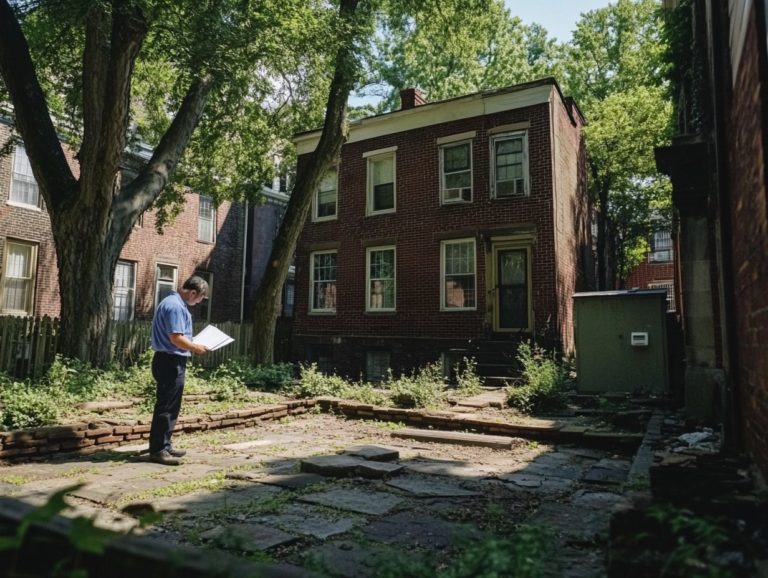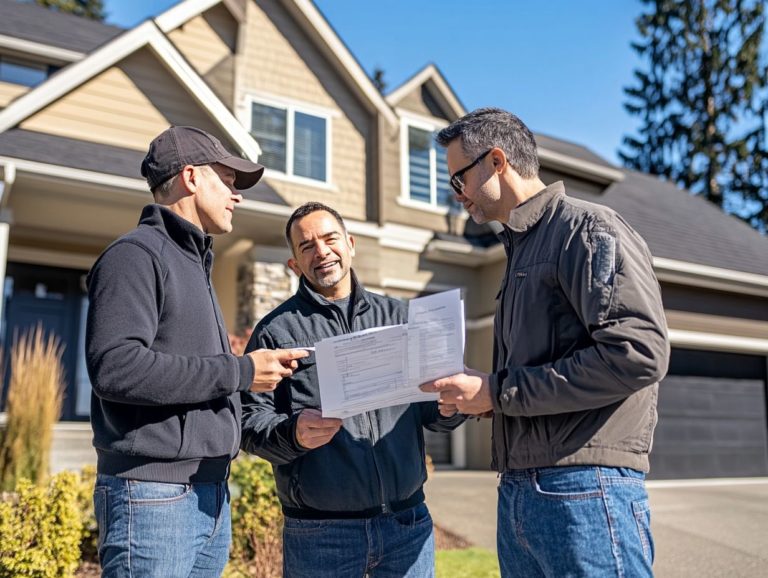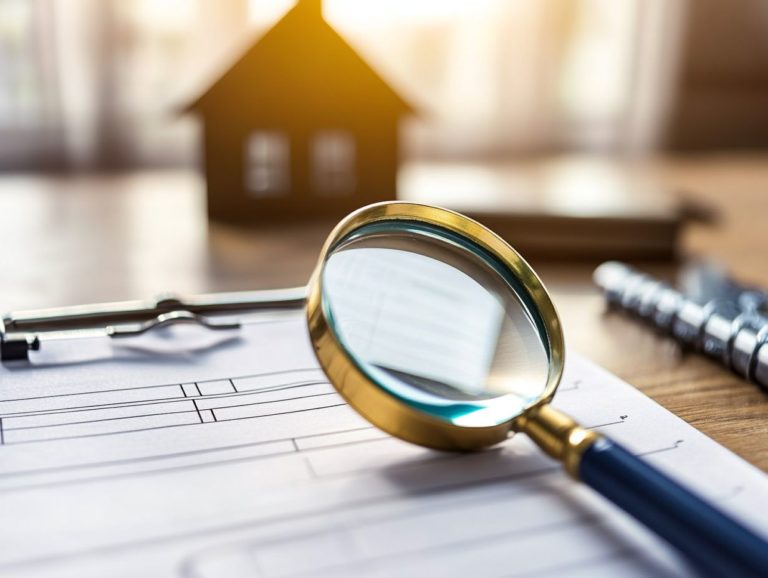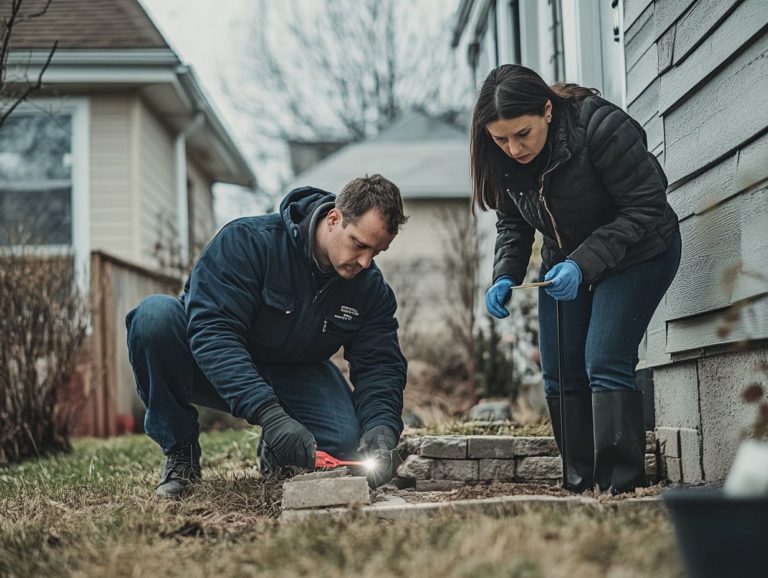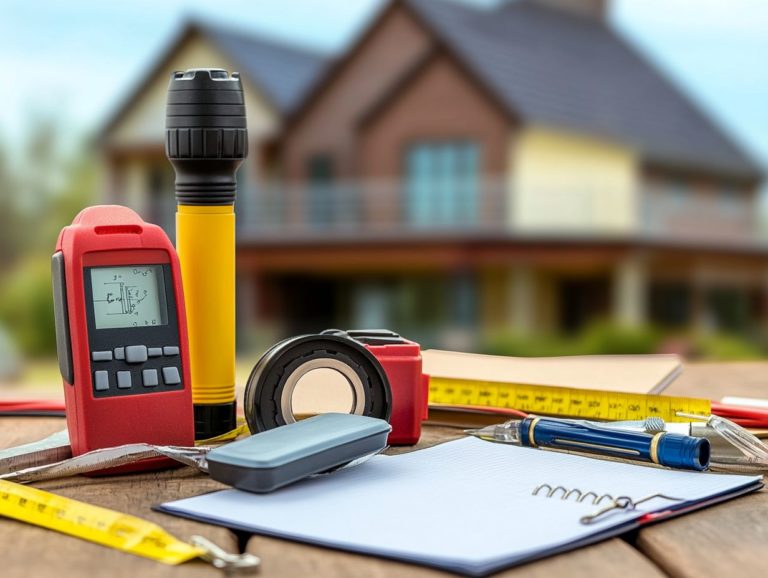Home Inspection Tips for First-Time Buyers
Buying your first home is an exciting adventure! Grasping the importance of a thorough home inspection can truly be a game-changer.
This guide will walk you through the inspection process. You ll learn what to expect, how to select a qualified inspector, and the common issues that may arise. You’ll also find valuable tips tailored for first-time buyers.
By the time you finish, you ll feel empowered to navigate your home buying journey with absolute confidence, ensuring that your investment is both sound and secure.
Contents
- Key Takeaways:
- Why Home Inspections are Important
- Choosing a Qualified Home Inspector
- What to Expect During a Home Inspection
- Common Issues Found During Home Inspections
- Tips for First-Time Home Buyers
- Negotiating Repairs and Renegotiating the Sale Price
- Final Thoughts on Home Inspections
- Frequently Asked Questions
- What is a home inspection and why is it important for first-time buyers?
- How should I choose a home inspector for my first home?
- What should I expect during a home inspection?
- Should I attend the home inspection as a first-time buyer?
- What if the home inspection reveals major issues?
- Can I do the home inspection myself as a first-time buyer?
Key Takeaways:

- Home inspections are crucial for first-time buyers to uncover any potential problems with the property.
- Choose a qualified home inspector by checking their state licensing and industry certifications.
- Be prepared for the inspection and understand the report to negotiate repairs or the sale price effectively.
- Regular inspections and maintenance are important for the longevity of the home.
Why Home Inspections are Important
Home inspections are essential in the home buying journey, as they provide you with a detailed evaluation of a property’s condition and highlight the importance of home inspections for property buyers.
A careful inspection not only uncovers potential issues but also enlightens you about the maintenance needs of vital home systems, empowering you to make well-informed decisions.
A licensed inspector will guide you through the inspection report, providing invaluable insights into the property. These insights can greatly influence your negotiation strategies and closing costs.
Understanding the Purpose and Process
The purpose of a home inspection is to provide you with a detailed evaluation of a property’s condition. This ensures you’re well-informed before making such a significant investment.
The inspection process begins with a comprehensive checklist tailored specifically to the aspects of the home. It covers everything from the foundation to the roof.
Inspectors follow established standards that guide their evaluations, guaranteeing consistency and thoroughness. During the inspection, findings are meticulously documented.
This detailed report shows the home’s current condition. It also helps you anticipate future repair costs, ultimately empowering you to make informed decisions.
Choosing a Qualified Home Inspector
Choosing a qualified home inspector is paramount for obtaining a comprehensive evaluation of a property’s condition. Their expertise plays a crucial role in shaping the results of the inspection process.
Qualifications to Look for and Questions to Ask
When selecting a home inspector, it’s essential to verify their licenses and certifications. These credentials reflect the inspector’s expertise and dedication to the profession.
Beyond these qualifications, consider the inspector s relevant experience, particularly regarding the type of property you re interested in. For instance, if you’re eyeing a historic home, an inspector with extensive experience assessing older properties could prove invaluable.
Don t shy away from engaging in direct conversation ask the right questions. Inquire about their inspection process to ensure it meets your expectations. Clarify the timeline for receiving the report, and request references from previous clients.
By taking these steps, you’ll be well-equipped to choose an inspector who will meticulously evaluate your prospective home, ensuring you understand the benefits of home inspections for buyers.
What to Expect During a Home Inspection

During a home inspection, you can anticipate a comprehensive visual examination of the property s various systems.
This thorough assessment will encompass everything from any structural damage to essential home systems like plumbing, electrical, heating, and cooling.
Get ready for a thorough exploration!
Areas and Systems That Will Be Inspected
A thorough home inspection covers essential areas and systems, including the electrical system, plumbing, heating, cooling, and other vital components that contribute to a safe and functional living space.
Each of these systems plays a crucial role in maintaining your comfort and well-being at home. Consider common electrical issues, such as outdated wiring or overloaded circuits; these can create safety hazards that you certainly want to avoid.
Likewise, plumbing problems like leaks or corrosion can lead to costly water damage if not fixed quickly. Your heating and cooling systems also need to operate efficiently to ensure consistent temperatures and quality air throughout your home.
Identifying and fixing these concerns early can help you avoid costly repairs in the future, protecting your investment and elevating the overall quality of life in your space.
Common Issues Found During Home Inspections
Home inspections typically reveal a variety of common issues, ranging from minor defects to more significant concerns. All of these can greatly affect the safety and functionality of the property.
It’s crucial for buyers to be aware of these potential problems to make informed decisions.
Identifying and Addressing Major Problems
Identifying major defects during a home inspection is essential, as these issues can lead to substantial repair costs and greatly affect the property’s overall value.
Inspectors leverage their expertise to uncover serious concerns, such as structural issues, electrical hazards, or plumbing failures. They carefully document their findings in a comprehensive inspection report.
This report becomes an invaluable resource for potential buyers, offering detailed insights and spotlighting critical problems that might not be immediately visible. Equipped with this knowledge, you can take necessary actions.
This might mean negotiating with the seller for repairs or requesting a price reduction to account for expected costs. Engaging in this dialogue not only gives you the power but also ensures that your investment is protected against unforeseen expenses down the road.
Tips for First-Time Home Buyers
For first-time home buyers, navigating the home inspection process can be daunting. However, by familiarizing yourself with the inspection report and embracing the role of home inspections, you can transform this experience into a more manageable and informed journey.
Preparing for the Inspection and Understanding the Report

Preparing for a home inspection means equipping yourself with knowledge about what to expect and how to interpret the inspection report, which will detail key findings that highlight the importance of home inspections for buyers and can significantly influence your home-buying decision.
As a first-time buyer, this involves familiarizing yourself with the typical areas under evaluation, such as the roof and foundation, while also being proactive in engaging with the inspector. Understanding the basics of home inspection for buyers can greatly enhance your experience.
It s wise to compile a list of essential questions to ask during the inspection, such as inquiring about the age of major systems like HVAC (Heating, Ventilation, and Air Conditioning), plumbing, and electrical setups.
Once you receive the inspection report, careful analysis becomes essential. You’ll want to focus on any significant issues that could hint at future repairs or negotiations with the seller.
It s vital to fully grasp the implications of each finding for your potential investment, ensuring you re making a well-informed decision.
Negotiating Repairs and Renegotiating the Sale Price
Negotiating repairs based on the insights from the home inspection report can profoundly influence both the sale price and closing costs.
This step is essential in the home buying process, as it allows you to ensure that your investment is sound and that any necessary adjustments are addressed before finalizing the deal.
Ready to take the next step in your home buying journey? Make sure to get a thorough home inspection by following home inspection tips for older homes to protect your investment!
How to Handle Issues Found During the Inspection
Handling issues found during a home inspection requires a clear approach. You need to balance necessary repairs with their impact on the sale price and home valuation.
Start by discussing your concerns about the inspection findings with the seller. This open dialogue fosters productive discussions. It s crucial to determine which issues require immediate attention and which can be addressed later through negotiation.
Utilize the repair costs identified in the inspection report as a strong bargaining tool. You can negotiate for price reductions or request that the seller handle significant repairs before finalizing the sale. This strategy not only aims to reduce your overall transaction costs but also offers peace of mind regarding the home s condition and any future investments you might need to make.
Final Thoughts on Home Inspections
In conclusion, regard home inspections as a vital part of the home buying journey. They provide not just a necessary step in the purchasing process but also an opportunity for ongoing inspections and maintenance, ensuring the long-term health of your property.
Remember, regular inspections and maintenance are crucial for preserving your home’s condition and protecting your investment.
The Importance of Regular Inspections and Maintenance
Regular inspections and maintenance of your home are essential for preserving its condition and safeguarding the investment you’ve made.
By proactively addressing minor issues before they escalate, you enhance your living environment and boost your property’s value. Routine assessments give you the power to make informed decisions about necessary repairs, ultimately saving you a considerable amount of money over time.
Practical tips, such as routinely checking your roof for leaks, ensuring proper drainage around the foundation, and servicing your appliances, can significantly extend their lifespan.
When you educate yourself on common maintenance tasks, you cultivate a sense of ownership and responsibility, leading to a more secure and enjoyable living space.
Frequently Asked Questions

What is a home inspection and why is it important for first-time buyers?
A home inspection is a thorough examination of a property’s condition, usually conducted before purchasing a home. It’s important for first-time buyers because the importance of a home inspection lies in uncovering potential issues or problems, allowing them to make informed decisions and avoid unexpected expenses in the future.
How should I choose a home inspector for my first home?
Choosing a qualified and experienced home inspector is crucial. Ask for recommendations from your real estate agent or friends and family who have recently purchased a home. Also, check the inspector’s credentials and reviews before hiring them.
What should I expect during a home inspection?
During a home inspection, the inspector will examine the structural components, exterior, and interior of the home, including the roof, attic, plumbing, electrical systems, and more. They will also look for any potential safety hazards or maintenance issues. The inspection usually takes a few hours, and the inspector will provide a detailed report afterward.
Should I attend the home inspection as a first-time buyer?
Don’t miss the chance to attend the home inspection it’s your opportunity to learn and ask questions! Attending helps you better understand the inspector’s findings in the report and make a more informed decision about the purchase.
What if the home inspection reveals major issues?
If the home inspection uncovers major issues, discuss them with your real estate agent and possibly negotiate with the seller for repairs or a lower price. If the issues are significant and the seller is not willing to address them, you can choose to walk away from the purchase.
Can I do the home inspection myself as a first-time buyer?
It is not recommended for first-time buyers to conduct the home inspection themselves. Home inspectors have the necessary training, experience, and equipment to assess a property’s condition properly. Investing in a professional home inspection is worth it, especially when considering home inspection tips for fixer-uppers, to ensure the safety and quality of your potential new home.

